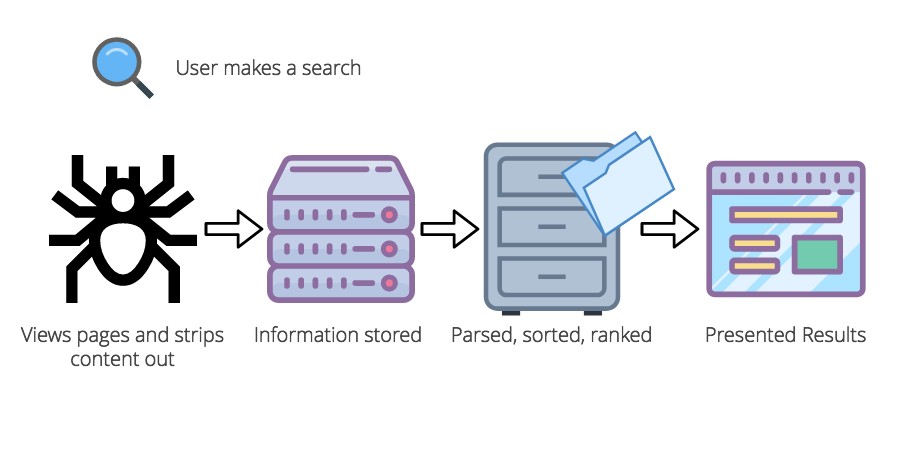Search engines work entirely off of algorithms, which are mathematical formulas written to find data. Each search engine has its own algorithm and nobody knows exactly how they work or what those algorithms are. In this article, we’ll talk briefly about what we do know, in hopes that it will help you put more technical thought into your keywords and content structure. For the purpose of this article, let’s compare how search engines work to common tasks you would do so that it’s easier to digest the technicality of the process.
How Do Search Engines Work?
Crawling
The first thing you want to do with data is to organize it, right? So crawling is you gathering up all documents that may need to be referenced at a future time.
Spiders
How would you find that data and connect pieces that belong together? Spiders are how search engines travel through data, collecting information as it moves along. So think of this as the form of how you would travel to obtain all these documents.
Indexing
Once you have obtained the documents, you need to organize them in a relevant fashion. You’ll make clear labels, categories, and make sure pieces related to other documents are nearby. This is how search engines work to provide the relevant data back to users. It looks at keywords, backlinks, publishing dates, etc to find results.
Page Ranking
After the previous steps are completed, search engines now know where to place, or rank, the data. Much like you know where and how to organize what you will use in your kitchen. Relevance is important. Keywords and content should match up. It makes more sense to have pots and pans hanging over the stove than cups.
Backlinks
Although these aren’t a requirement, they will help your ranking. But it isn’t just about volume as much as quality. Who is linking to your site and how often? Think of it as a cookbook. If one comes highly recommended by people you already trust for recipes, you’re more likely to look at that book first. That’s similar to how search engines work when they decide what sites have more authority.
Relevance
This is also combined with the authority we were just talking about. Sites will more likely be considered to have more authority and relevance if they have a higher number of quality backlinks and good content. When sites with more authority link to you, and vice versa, the better the results you receive from being deemed authoritative and relevant. So again, the most highly recommended books of recipes, from sources you trust, would be at the top of your list for new cookbooks to try.
Words
It’s as simple as us looking through a cookbook for the words we are looking for. If we want chicken alfredo we look for “Chicken” and “Alfredo”. Search engines work the same way, by parsing out the pages that have the words “chicken” and “alfredo” in them. Our brains are more likely to stop when we see “chicken” and alfredo” right next to each other; “chicken alfredo”. The proximity of the words we are looking for is important when we’re scanning a book, and they matter in search engines too. How close these words are together will improve ranking. So “Chicken Alfredo Recipe” might work better than “Chicken in a Creamy Alfredo Sauce”. Of course, your metadata matters too. Where do the keywords pop up, what’s the title of the page, etc.
Date
How new is the content? This doesn’t mean older articles can’t be relevant or rank well, but it does mean that newer pieces of content for the same topic may have the chance to rank higher. Maybe the Chicken Alfredo recipe from 1998 is truly your favorite, but surely there’s plenty of relevance to many newer recipes that you wish to try? This is the best way to think about how search engines work when they are placing a value on publishing dates. It’s not the most important factor but it matters. Search engines are good about trying to keep new content churning in with the top results.
Rank Brain
In 2015, Google introduced an artificially intelligent program into their algorithms to help improve search query results. The program does what basic algorithms couldn’t do, understand human semantics. What was once a system focused mainly on keywords and backlinks is now more equally divided by a system that also tries to interpret what a user means, rather than exclusively looking at what they typed. If it seems hard to grasp think about a time when what you meant to say was interpreted differently by someone because of what you said. Now imagine a system that could prevent those misunderstandings. That’s the point of RankBrain as it becomes a larger part of Google’s search engine.
What Does This Mean for You?
It means you can’t skimp out on the things that matter in regards to how search engines work. As technology improves to provide better user experience, strategy on the backside must grow to accommodate these changes. That’s why SEO is never a one and done activity. It’s why you regularly need new content to be published on your site. Why do search engines do this? Because it’s what’s best for their users. Imagine if no new movies were ever released, no new books written, or no new video games produced. So produce content and produce it well, because the age of technology is only moving forward from here.
________________
Do you have anything you’d like to contribute here? Are there any analogies you can give that are better that I can share with my audience? As always, I’d love to hear your thoughts. Let’s connect on LinkedIn so we can share ideas, support, and updates.

